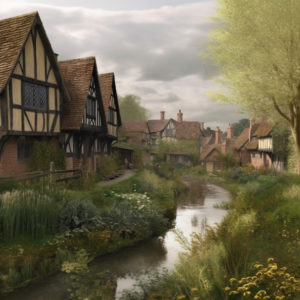Overview
The last name Lewis comes from a lot of different countries and languages, and it has changed a lot over the course of history. The name Lewis comes from the Old Frankish name Chlodowig. It went through several changes, such as Clovis and Ludwig, before ending up as it is today in English. The name was brought to England during the Norman Conquest in 1066, where it started out as a patronymic last name. By the 13th century, it was well-established, with different regional dialects like Lewes and Louis. Lewis has Anglo-Norman roots, but it is also an Anglicized form of the Welsh name Llywelyn. This shows how names can be adopted and changed across different language areas. Also, among Jewish people, the last name comes from Levi, which shows how important and widespread it is in many cultures. The name has stayed popular over the years, especially in Wales, where it is still one of the most common last names. The name has changed over time, with versions like Lewes, Louis, Lowis, and Lawes. This shows how flexible it is and how different languages and areas have affected it. Learning about how the last name Lewis has changed over time shows how complex the cultural and language factors are that have shaped its history.

Historical Background
The name Lewis comes from an old Welsh family that lived in Carmarthen, Wales, for a long time. David Lewis, who moved to Ireland around the middle of the 17th century and settled in Waterford, became a well-known person there. He was Mayor and Alderman several times before his death in 1718. Some of his famous relatives were William Lewis, who was the Archdeacon of Kilfenora, and David Lewis, who also had a long and important career in the church. The Lewis last name came to the Americas with the first settlers in the 1600s. Roger Lewis, who came to Virginia in 1623, was the first person with that last name to be mentioned in what would become the United States. After that, in 1634, Edmond and John Lewis moved to New England. People left their home countries for a variety of reasons, but most of the time it was because they were unhappy with the political and social conditions there, such as bad sanitation, sickness, and a lack of land and jobs. This influx of Lewis people helped make the large number of Lewis descendants living in the United States. Aside from that, the Lewis family tree has ties to many important people and groups throughout history. One example is the family of Henry Owen Lewis, who was an M.P. for Carlow and held other important local positions. This shows how popular the Lewis name remained in Ireland in the 1800s. The story of the Lewis family name’s history is made more interesting by these different branches and what they did in local and larger historical settings.
Variants and Spelling
There are a lot of different ways to spell the last name Lewis, which shows how the language and history have changed over time. Over time, different spellings of the name have come into use, such as Louis, Luis, and Lewes. Each one has its own cultural and regional effects on the name. There are also a lot of different ways to say the name Lewis. The most common way is “LOO-is,” but area accents can make it sound like “Loo-EE” or “Loo-iss,” each with its own unique sound.
Spelling Variations
Lewis’s name has changed many times over the years, often because of area dialects and phonetic spelling rules. This isn’t just true for Lewis; it’s a trend seen in many last names, especially those with Welsh roots, where the person writing down the name often decided how to spell it, leading to different forms like Lewiss, Lewess, Lews, Llewys, Llewis, and Lewwis. These differences might not be mistakes; they could be caused by the fact that people speak different languages and that the family is from different places or cultures.
Evolution Over Centuries
In its long history, the name Lewis has changed a lot. Its roots can be found in the Old Frankish name Chlodowig, which later became Clovis and Ludwig in Germanic settings. The name made its way to the British Isles when the Normans took over England in 1066. This made it easier for it to become the more common form Lewis. The way the name has changed over time shows how it can change with the times and politics.
Notable People with the Surname
The last name Lewis has been used by many famous people in many areas, such as literature, politics, music, the arts, and exploration.
Sports
Carl Lewis, an Olympic track and field athlete with the last name, is known for winning many gold medals and being thought of as one of the best players in his field. These people show the wide range of things that people with the last name Lewis have done, which shows how important it is in history and culture.
Explorers and Historical Figures
Meriwether Lewis, an American explorer and general in the U.S. Army, is one of the most famous people with this last name. He is known for leading the Lewis and Clark Expedition, which was a key part of exploring the American West. C.S. Lewis, an Irish author and lay theologian best known for his books like the popular “Chronicles of Narnia” series, is another important person.
Civil Rights Leaders
John Lewis was an important figure in the fight for racial freedom in the United States. He was a famous civil rights leader and Congressman. As a leader in the civil rights movement, his work led to a seat in the U.S. House of Representatives, where he continued to fight for social justice.
Entertainment and Arts
Jerry Lewis, an American comedian, actor, and director known for his slapstick humor and important services to film and charity, is one of the most famous people in the entertainment world. Leona Lewis is a British singer and songwriter who became famous for her strong voice, especially on her hit song “Dying My Heart.” American stand-up comic and actor Richard Lewis is known for his work on the HBO show “Curb Your Enthusiasm” and in solo shows.
Cultural Significance
There are many cultural meanings attached to the last name Lewis, especially in the fields of writing and anthropology. Famous people with this last name, like C.S. Lewis, have made important accomplishments that go beyond their specific fields.
Contributions to Literature
The most famous person with the last name Lewis was probably C.S. Lewis (1898–1963). Many of his books, like “The Chronicles of Narnia” series and “Mere Christianity,” have had a lasting impact on both children’s literature and Christian defense literature. His works have been read and influenced by people of all generations because he can explore difficult theological ideas through interesting stories. Lewis’s reading choices focus on moral and spiritual topics, which adds to ongoing conversations about faith and human nature.
Influence in Anthropology
The last name Lewis is linked to critical talks about cultural relativism and how to understand different human societies in the field of anthropology. Franz Boas, who is often called the “father” of American anthropology, pushed for cultural relativism, which means looking at each culture in its own unique way instead of through the lens of another culture. This view has led to a deeper and more knowledge of cultural differences, which is at the heart of modern anthropological work.
Symbolic Anthropology
Clifford Geertz (1926–2006), who was also a major figure in anthropology, brought the idea of “thick description” to cultural studies. This concept emphasized how important symbols and their meanings are in cultures. His work has had a big impact on how we think about culture as a set of inherited ideas that are expressed through symbols. It has had an impact on not only anthropology but also sociology and performance studies. The work of people like Geertz and Boas shows how ideas about culture analysis are always changing. This shows that the Lewis family name is part of a larger intellectual history.
Genealogy and Family Heritage
The Lewis last name has a long and interesting family background. It comes from a lot of different ancient families, mostly in Wales and Ireland. Notably, the family is thought to be descended from Cadifob, who was buried in the priory of Caermarthen and was a prince or leader who lived during the Norman Conquest. David Lewis, who moved to Ireland in the 1600s and became an Alderman and Mayor of Waterford, was one of the important people in the family line. The first person with the last name Lewis to come to America was Roger Lewis, who arrived in Virginia in 1623. After them, people like Edmond and John Lewis came to New England in 1634, which helped spread the last name across the United States. There is a lot of information about the Lewis family in genealogical studies, like Gilbert Cope’s “Genealogy of the Sharpless Family,” which goes into detail about the family’s English and American roots. Genealogists today can use online databases like Ancestry.com and FamilySearch to find out about their ancestors. These databases have a lot of historical records that help genealogists build family trees and understand ancestry. Genealogy software, like Gramps and RootsMagic, can help you organize your results and see how your family has been connected through the years. A lot of people with the last name Lewis have also made important contributions to many different areas. Notable examples include Meriwether Lewis, an American explorer, and Sinclair Lewis, a Pulitzer Prize-winning author. This range of people shows how important the last name is to American history and culture. New DNA studies show that a lot of people with the last name Lewis have ancestors who lived in the UK, Ireland, or Northern Ireland. This suggests that these places were important for the family line’s origins. Learning about the haplogroups linked to the Lewis name can also help you understand the wider genetic background and migration trends of people with that last name.


